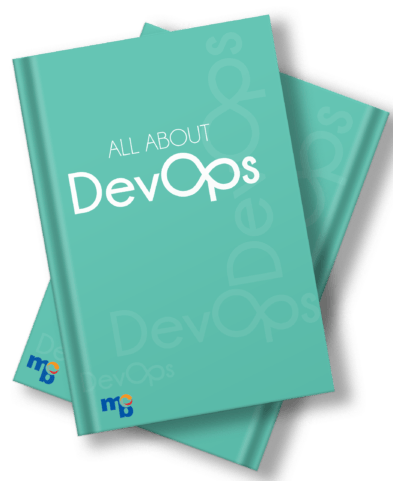Today, every organization aims to streamline its software development processes for faster delivery and improved code quality. Our DevOps expert at Mindbowser, Manish Kumar Singh, says DevOps plays a crucial role in achieving these goals effectively.
When you embrace DevOps culture, it promotes seamless collaboration among the team members from the onset of the (software development lifecycle) SDLC.
While it may seem overwhelming initially, DevOps offers significant long-term benefits and return on investment. If you’re a decision-maker overseeing technical and operational aspects, it’s your responsibility to ensure your organization’s growth.
One of the most effective ways to make DevOps less overwhelming is having a DevOps implementation roadmap, as it includes finer details of what you need in your DevOps journey.
There are many benefits of the DevOps implementation roadmap for CIOs and CTOs. We have mentioned some of the most significant of them in the following sections.
A DevOps roadmap is a strategic plan that outlines an organization’s journey to adopt and integrate DevOps practices into its software development and IT operations processes. It is a guiding document that defines the steps, goals, and milestones for successfully implementing DevOps principles and methodologies.
This roadmap typically includes an assessment of the organization’s current state, clear objectives aligned with business goals, the formation of dedicated DevOps teams, cultural transformation initiatives, the selection and integration of appropriate tools and automation strategies, and the establishment of continuous integration and continuous delivery (CI/CD) pipelines. It also emphasizes the importance of monitoring, feedback loops, and ongoing optimization to drive efficiency, quality, and collaboration. A well-structured DevOps roadmap helps organizations navigate the complexities of cultural change, process improvement, and technology adoption, ultimately leading to accelerated software delivery and improved operational outcomes.
DevOps isn’t just a buzzword; it’s a strategic approach that redefines how IT organizations operate. Implementing DevOps practices without a roadmap can be akin to navigating uncharted waters. Let’s delve into why CIOs and Chief Technology Officers (CTOs) need a DevOps roadmap:
When planning to implement DevOps practices, many software development companies lack a clear understanding of their objectives and goals. As a CIO/CTO, you must advocate for DevOps and demonstrate its value to your organization. Creating a DevOps roadmap can help you clarify and convey your strategy to stakeholders. It includes actionable steps and milestones that help you be on the right track.
If you don’t emphasize having a DevOps implementation roadmap, your business can soon get distracted from its goals, leading to confusion and wasted efforts.
Another important benefit of having a DevOps implementation roadmap is that you can effectively align DevOps efforts with the broader business objectives. The roadmap bridges IT and other business goals, ensuring the DevOps strategy supports the company’s growth and profitability goals.
As a CIO/CTO, you must demonstrate the importance of DevOps for your software development processes and how it will benefit you. With a DevOps roadmap, not only can you have a better understanding of the strategy, but you can also convey the same to all the people involved in the project.
We all know how critical it is to plan your resources in advance if you want your strategies to be successful. It is no exception when it comes to DevOps implementation. In executing DevOps, you will need a variety of tools, infrastructure, and resources across all the stages of DevOps.
When you have a DevOps implementation roadmap, it helps you plan and allocate these resources effectively. For example, if you know that you will need specific CI/CD tools and human resources after six months, you can start researching the tools in advance while looking for the right candidate that matches your requirements and budget.
Moreover, resource planning prevents any hurdles or delays you might have to face if things are not planned.
Implementing DevOps is great but comes with its own challenges. These challenges range from cultural resistance, initial learning curve, and lack of adequate tools, technologies, processes, resources, and the right KPIs to measure the success of your DevOps strategies.
However, if you have a DevOps implementation roadmap, you can mitigate all these challenges by having a proactive approach and enjoying a smooth journey throughout your project.
There are numerous components to DevOps, including automation, continuous integration, continuous delivery, and cultural changes. Each of these components needs attention to complete the circle of DevOps.
Having a DevOps implementation roadmap helps CIOs and CTOs identify and prioritize the areas that must be addressed first.
For example, when you know that development will need prioritization over delivery in the initial stage of DevOps, you can divert your energy, focus, and resources in that direction.
DevOps methodology is such in nature that it involves incremental progress at each stage. In other words, one step at a time, and each step builds upon the previous one and so on.
With a clear roadmap, you can easily break down your overwhelming DevOps strategy into small, manageable phases to make things easier and manageable.
For example, with a roadmap, you will know when your development phase will be complemented and it’s time for the testing and deployment phase. Moreover, you can prepare your team for the next phase by informing them beforehand.
In short, a DevOps roadmap allows organizations to celebrate small wins along the way and maintain momentum.
When incorporating new technology, companies are bound to face carrier risks. A DevOps implementation roadmap helps you identify potential risks and incorporate risk mitigation strategies to minimize the impact.
For example, if you know that by implementing DevOps, you may invite risks for your legacy systems – you can either change your legacy systems or incorporate other solutions that help you execute your DevOps strategy effectively.
Moreover, your existing chain of tools and technologies can also pose a threat to the DevOps ecosystem, but if you know these hurdles in advance, you can have their solutions ready beforehand.
If you have done enough research on DevOps, you would know it is a cultural change rather than just a change of tools and technologies. A roadmap helps you craft change management strategies to help the organization embrace DevOps principles and practices effectively.
Based on a DevOps implementation roadmap, you can plan DevOps training communication plans and prepare a safe ground for team members to enable them to collaborate with each other more frequently.
When investing in any new technology, it’s crucial to establish Key Performance Indicators (KPIs) and have definitive points to measure the success of your DevOps strategy. A roadmap helps you have plans for the right time to evaluate progress because if you do it too early or too late, you will miss critical information, affecting your business.
Additionally, this data-driven approach to tracking impact and insights gives companies tangible data to justify their decisions.
DevOps is an ongoing journey of improvement. A roadmap doesn’t just end with the initial implementation plans but also includes phases of continuous improvement. It demonstrates how the organization will adapt and improve DevOps practices to remain competitive and responsive to changing market conditions.
For example, you can have milestones decided when teams need to have process review meetings to identify the loopholes and scope of improvements. If the things you are implementing are not achieving the desired results, you can change them and try better approaches to achieve your goals.
Lastly, executive support is vital for the success of any major organizational initiatives, including DevOps. The DevOps roadmap provides a compelling case for C-suite executives, explaining the benefits, risks, and expected outcomes of DevOps implementation. With this support, CIOs and CTOs can secure the necessary buy-in and resources to drive the initiative forward.
If you are a non-tech founder or C-executive, we can understand that it can be difficult sometimes! Well, we have got you covered!
Watch our video about how a non-tech person can build a successful build tech company👇
Implementing DevOps can be a complex and daunting task, but you don’t have to go it all alone. Partnering with the right company can significantly ease the process and increase the likelihood of success.
Here’s how we help companies in their DevOps journey
At Mindbowser, we comprehensively assess your organization’s current state, identifying strengths, weaknesses, and areas of improvement. Based on this assessment, we collaborate with your team to develop a tailored DevOps strategy aligned with your business objectives.
Choosing the right DevOps tools and technologies is critical. We help you select and implement the most suitable tools for your organization’s needs, ensuring seamless integration and automation.
As DevOps is more than a technology transformation, our team helps you build a culture of collaboration, transparency, and continuous improvement. We provide guidance on cultural transformation and change management, helping your organization embrace DevOps principles.
To succeed with DevOps, your team needs the right skills. We offer training programs and workshops to upskill your personnel in DevOps practices and tools.
DevOps is an ongoing journey. We help your company establish KPIs, continuously monitor your DevOps processes, and identify areas for optimization. It ensures that your DevOps implementation remains effective and evolves with your organization’s needs.
At Mindbowser, we aim to keep our clients happy all the time. As DevOps is an ongoing journey, we provide you with round-the-clock support to address any issues or concerns that may arise during the implementation and operations of your DevOps practices.
A DevOps roadmap contains the fine details of the entire software development and maintenance process, from development to operations, spanning the entire technology stack.
A DevOps implementation roadmap is an integral visual summary of the software development process, ensuring easy fulfillment of the DevOps objectives in the organization. A DevOps roadmap acts as a blueprint for implementing DevOps practices smoothly.
The primary purpose of implementing a DevOps approach is to eliminate manual processes and inefficiencies, improving the development process. It also helps break the silos between teams resulting in improved collaboration.
To create a DevOps roadmap, you will need to define your clear objectives, set focused, short-term goals and plans, use visual cues, communicate the roadmap with all the team members involved, and update your roadmap as you achieve your goals.
Monitoring the entire process of DevOps is one of the most challenging parts of DevOps as it has several moving parts, and each of these has different metrics to judge their effectiveness.

Increase profitability, elevate work culture, and exceed productivity goals through DevOps practices.
Download Now
We worked with Mindbowser on a design sprint, and their team did an awesome job. They really helped us shape the look and feel of our web app and gave us a clean, thoughtful design that our build team could...


The team at Mindbowser was highly professional, patient, and collaborative throughout our engagement. They struck the right balance between offering guidance and taking direction, which made the development process smooth. Although our project wasn’t related to healthcare, we clearly benefited...

Founder, Texas Ranch Security

Mindbowser played a crucial role in helping us bring everything together into a unified, cohesive product. Their commitment to industry-standard coding practices made an enormous difference, allowing developers to seamlessly transition in and out of the project without any confusion....

CEO, MarketsAI

I'm thrilled to be partnering with Mindbowser on our journey with TravelRite. The collaboration has been exceptional, and I’m truly grateful for the dedication and expertise the team has brought to the development process. Their commitment to our mission is...

Founder & CEO, TravelRite

The Mindbowser team's professionalism consistently impressed me. Their commitment to quality shone through in every aspect of the project. They truly went the extra mile, ensuring they understood our needs perfectly and were always willing to invest the time to...

CTO, New Day Therapeutics

I collaborated with Mindbowser for several years on a complex SaaS platform project. They took over a partially completed project and successfully transformed it into a fully functional and robust platform. Throughout the entire process, the quality of their work...

President, E.B. Carlson

Mindbowser and team are professional, talented and very responsive. They got us through a challenging situation with our IOT product successfully. They will be our go to dev team going forward.

Founder, Cascada

Amazing team to work with. Very responsive and very skilled in both front and backend engineering. Looking forward to our next project together.

Co-Founder, Emerge

The team is great to work with. Very professional, on task, and efficient.

Founder, PeriopMD

I can not express enough how pleased we are with the whole team. From the first call and meeting, they took our vision and ran with it. Communication was easy and everyone was flexible to our schedule. I’m excited to...

Founder, Seeke

We had very close go live timeline and Mindbowser team got us live a month before.

CEO, BuyNow WorldWide

If you want a team of great developers, I recommend them for the next project.

Founder, Teach Reach

Mindbowser built both iOS and Android apps for Mindworks, that have stood the test of time. 5 years later they still function quite beautifully. Their team always met their objectives and I'm very happy with the end result. Thank you!

Founder, Mindworks

Mindbowser has delivered a much better quality product than our previous tech vendors. Our product is stable and passed Well Architected Framework Review from AWS.

CEO, PurpleAnt

I am happy to share that we got USD 10k in cloud credits courtesy of our friends at Mindbowser. Thank you Pravin and Ayush, this means a lot to us.

CTO, Shortlist

Mindbowser is one of the reasons that our app is successful. These guys have been a great team.

Founder & CEO, MangoMirror

Kudos for all your hard work and diligence on the Telehealth platform project. You made it possible.

CEO, ThriveHealth

Mindbowser helped us build an awesome iOS app to bring balance to people’s lives.

CEO, SMILINGMIND

They were a very responsive team! Extremely easy to communicate and work with!

Founder & CEO, TotTech

We’ve had very little-to-no hiccups at all—it’s been a really pleasurable experience.

Co-Founder, TEAM8s

Mindbowser was very helpful with explaining the development process and started quickly on the project.

Executive Director of Product Development, Innovation Lab

The greatest benefit we got from Mindbowser is the expertise. Their team has developed apps in all different industries with all types of social proofs.

Co-Founder, Vesica

Mindbowser is professional, efficient and thorough.

Consultant, XPRIZE

Very committed, they create beautiful apps and are very benevolent. They have brilliant Ideas.

Founder, S.T.A.R.S of Wellness

Mindbowser was great; they listened to us a lot and helped us hone in on the actual idea of the app. They had put together fantastic wireframes for us.

Co-Founder, Flat Earth

Ayush was responsive and paired me with the best team member possible, to complete my complex vision and project. Could not be happier.

Founder, Child Life On Call

The team from Mindbowser stayed on task, asked the right questions, and completed the required tasks in a timely fashion! Strong work team!

CEO, SDOH2Health LLC

Mindbowser was easy to work with and hit the ground running, immediately feeling like part of our team.

CEO, Stealth Startup

Mindbowser was an excellent partner in developing my fitness app. They were patient, attentive, & understood my business needs. The end product exceeded my expectations. Thrilled to share it globally.

Owner, Phalanx

Mindbowser's expertise in tech, process & mobile development made them our choice for our app. The team was dedicated to the process & delivered high-quality features on time. They also gave valuable industry advice. Highly recommend them for app development...

Co-Founder, Fox&Fork
